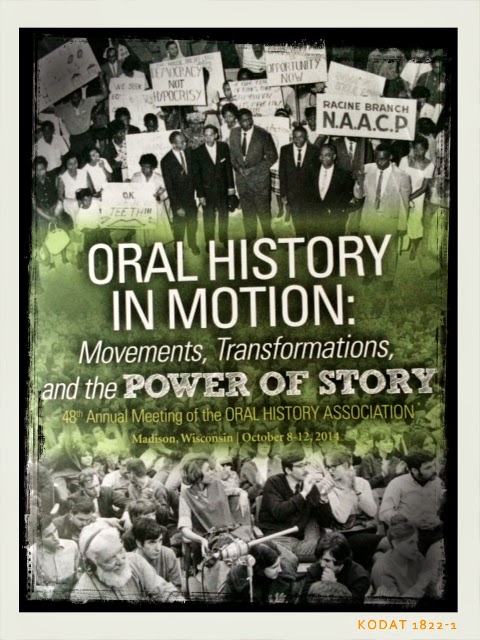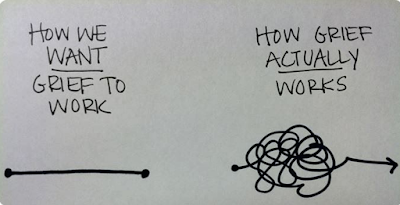"Seeing Through New Eyes?" Grappling with Identity/Identities
Is this a Derry granny?
Brought to you by British Telecom's "Portrait of a City,"an initiative designed to crowd-source community archives as part of the City of Culture events last year, this image of an older woman and sixteen children is one of eight photos that were enlarged last year, printed on heavy-duty tarp material and hung on the exterior wall of the Orchard Street entrance to the local shopping center, Foyleside.
It sits in the wall of the building just like a photo sits in a frame.
I took this photograph while going to catch a bus to visit my friend Bryonie, who is one of the most creative, effervescent and astute thinkers I know.
When it comes to thinking about Northern Ireland, I often get this Rumi quote in my head (I know, I know, the cliché of it all!!!!) "Out beyond right doing and wrong doing, there is a field. I'll meet you there." I always think of Bryonie on that field. Partly because she writes about landscapes and maybe because in my mind, a part of her own identity is intertwined with the fields of Leitrim. Mostly because she doesn't just reject, she simply enters into, gently scrutinizes and then deconstructs prescriptive, rigid, essentialist thinking about the histories, cultures and cultural politics of this place. All the dichotomies: them/us, north/south, Éire/UK, belonging/not belonging --- they lose resonance and are revealed as the caricatures they are. But she does it in a way that also affords the processes of their very construction respect. Like I said, formidable.
I was thinking about the image on the side of the mall, and thinking, too, about the past week or so that I have spent listening to older women tell me their stories of their mothers and their grandmothers in Derry and Donegal. Maybe that is why, within ten minutes of arriving at her house, I was telling Bryonie about my fears of an essentialist and essentializing argument in my manuscript. (Basically, this means a static, all-encompassing definition of identity that refuses to acknowledge difference, but also that ignores the fact that people are complex and everyone has a multifaceted identity. Dean Lee of the Rainbow Project has been doing some thoughtful writing about this in a Northern Irish context.)
I said something like this: I am having a hard time locating the line between an essentialist portrait of a community and a portrait that, in fact, came out of the similarly-lived experience, values and beliefs of many of its members.
Because of the granny in the picture. And all the grannies and great-grannies who shared their stories with me. Many shared their photographs as well. Each story is unique, each woman a complicated individual with her own way of seeing the world. But for so many, the themes resound. Family. Faith. The rituals that bound family and faith together.
Some stories were funny. Like Madeleine's story of her mother taking the holy water to bless the rooms of the house when a storm blew in and cut the power. Her husband coming home and saying, "Why on earth does it smell like Maggie Friel's chip shop in here???? She'd grabbed the vinegar instead of the holy water; must have been a good dousing.
Some were a little melancholy. A group of women shared stories of when and why they light a candle and say a prayer. One said, "That's all they think a granny's good for -- lighting a candle during exam time."
The stories reinforced what I have found in other sources about women in Derry in the decades before the 1960s and beyond. Boundless energy. Unbelievably hard-working. An unswerving loyalty to their families and friends. A generosity that is not only material, but also emotional --- they make space for others' foibles and they tend to forgive.
This is true across a sectarian division. Neither Catholics nor Protestants can lay claim to these attributes. (Forgetting a moment that these categories themselves tend to be essentialist.)
But I chose to focus my study on Catholic Derry. Theirs was the story I thought was ill-represented and in danger of getting lost. If I say all these things about Derry's Catholic or nationalist community, might it suggest I think their Protestant neighbors were less energetic, generous, loyal?
And how do you address causes? What was Catholicism? Or poverty and the solidarity it encouraged? What came out of the vestiges of a rural culture? What came out of an Irish-speaking cultural world?
What was just the moment, the cultural zeitgeist or milieu of a larger Derry, or the province, Ireland, the UK? Without knowing all the histories of all of these places at scale, what do I really know? Or was it just the way they were? (i.e. essentialized identity. ugh.)
I do not know if the picture above is of a Derry granny, or if it is, if she is a Catholic granny or a Protestant granny. She could be a music teacher, or she might have a little sweet shop in her front room. It could have been a sunny day and the camera provided novelty -- she might not have anything to do with the kids in the image.
But the image screamed, "Derry!" to me as I walked down the street to catch a bus. Am I essentializing?
Would love your thoughts.










Personally, I think these stories arise from class. Similar stories have been told to me by Griffintowners, not just the women, either, but also from the men, talking about their mothers, their sisters, their grandmothers. The women were the glue for the families, and therefore, the community. But, there is also the problem of essentialising, of losing all these unique and beautiful trees and their stories for the forest. I'll be curious how you work this out, if only because I am wrestling with the same problems.
ReplyDelete